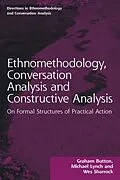This book revisits the arguments by which Harvey Sacks and Harold Garfinkel opposed the widespread attempt in the social sciences to construct disciplinary theories and methods in place of common-sense knowledge of human action, and proposed instead an alternative that would investigate the organised methods of natural language use and common-sense reasoning that constitute social orders - arguments that led to the establishment and proliferation of ethnomethodology and conversation analysis.
As the very "constructive analysis" that they opposed has begun to be incorporated into influential lines of research in ethnomethodology and conversation analysis, the authors return to the founding insights of the field and reiterate the importance of Garfinkel and Sacks' original and controversial proposals for an "alternate" sociology of practical action and practical reasoning. Showing how constructive analysis has become entrenched in ethnomethodology and conversation analysis and arguing for a need to "re-boot" these approaches, this volume constitutes a call for a renewal of the radical alternative proposed by Garfinkel and Sacks.
Autorentext
Graham Button is former Professor and Pro-Vice Chancellor for Arts, Computing, Engineering and Science at Sheffield Hallam University, and Laboratory Director of the Xerox Research Centre Europe.
Michael Lynch is Professor Emeritus in the Department of Science & Technology Studies at Cornell University, USA.
Wes Sharrock is Professor in the Department of Sociology at Manchester University, UK.
Inhalt
Preface
Introduction
Part I: Foundations: Garfinkel, Sacks and an Alternate Sociology
Chapter One: On Formal Structures of Practical Action
Chapter Two: Sequential Analysis as an Investigation of Formal Structures of Practical Action
Chapter Three: Ethnomethodological Studies of Work
Part II: Conversation Analysis
Chapter Four: Autonomous Structures of Conversational Actions
Chapter Five: Technical and Vernacular Description
Part III: Studies of Work and Organisational Contexts
Chapter Six: Institutional Talk
Chapter Seven: Workplace and Work Practice Studies
Part IV: Normalising EMCA
Chapter Eight: Importing Constructive Analytic Theory and Method
Chapter Nine: The Problem with Collections
Chapter Ten: A Case Study: Apologies and Constructive Analysis
Chapter Eleven: Conclusion
References
